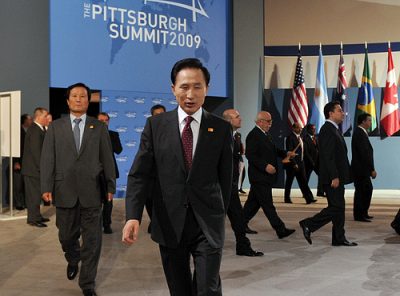The G20 certainly has the natural attributes to survive. Its legitimacy is irrefutable. The forum’s ‘Goldilocks size’ – not too big like the UN General Assembly, nor too small like the G8 – has been the key to its success. Unlike any other forum, the G20 includes a balance of developed versus developing states, and involves representatives from every major world .The G20 also accounts for 90 per cent of global market capitalisation, 80 per cent of global trade, 85 per cent of global GDP and two-thirds of the world’s population.
But the G20 has not yet reached its full potential. The organisation needs to seek a wider mandate than mere financial and economic matters.
For instance, the continuing gridlock of world trade and climate change negotiations cries out for the leadership that the G20 can provide. Excluding Argentina and Turkey, based on 2006 UN data, all of the countries making up the G20 are counted within the world’s top 20 carbon emitters. With China, India, Brazil and South Africa all in the one room, it makes sense for the G20 to be leading the charge on climate change.
The G20 includes the global hegemon and all its rivals, all five permanent members of the Security Council, at least six nuclear states, and three Islamic countries. For this reason, the G20 can also provide renewed hope for the international security paradigm at a time when the UN Security Council is losing credibility and authority.
What will be the major issues confronting the development of the G20?
The first stumbling block for a wider G20 agenda will be the lingering future of the G8, which has on various occasions had foreign aid, climate change, nuclear weapons and terrorism on its agenda.
The reality is, the G8 has not stood the test of time. A gathering of the world’s richest democracies, its relevance in a post-Cold War world is dwindling. Indeed, it is absurd to think that China would be locked out of any global negotiations. As the G20 continues to evolve, the G8 should continue to exist for the moment, but must become increasingly willing to cede power to its bigger brother.
In addition, the G20 is not structurally perfect. The G20’s activities are largely co-ordinated by a ‘troika’ of past, present and future chairs to ensure consistency. This is a weak mechanism. National governments take on an incredibly demanding and expensive role by hosting a meeting or holding the rotating presidency. Many also argue that most of what is issued publicly is ephemeral and affected to some degree by national bias.
To start with, the G20 must establish a permanent secretariat. Adopting a charter would also be helpful. Kevin Rudd could help to instigate these changes.
When establishing a secretariat the challenge will be finding the correct balance of formality. Informality has been key to the success of the G8. It has allowed leaders to break free of ‘briefing book syndrome’ and has avoided those dreaded post-summit communiques and the ensuing media cycle.
The G20 should also seek to better engage with the business community, academia and civil society.
In a similar fashion to APEC and the Commonwealth Forum’s Business Advisory Councils, the G20 should establish a permanent B20 business forum. The first of its kind has already been held in Toronto. The G20 should also seek to strengthen its ties with the academic community. In 1993 APEC did this by establishing a study centre consortium across the region in existing educational institutions providing a ‘think-tank’ element to their work.
Both APEC and CHOGM also hold ‘summits’ or ‘forums’ that allow civil society to engage with the issues as part of the formal proceedings. A G20 symposium would provide such an opportunity and bring into the room various groups advocating more inclusiveness in its deliberations.
In order for the G20 to succeed as the preeminent forum for global decision making it must transform itself into a formal institution with an expanded agenda. If this can occur, global stability, and global readiness to tackle the issue of climate change, can only improve.
Thom Woodroofe was the 2009 Young Victorian of the Year and founder of Left Right Think-Tank. He attended a conference on the G20’s future last week in Seoul, supported by the Australia-Korea Foundation of Australia’s Department of Foreign Affairs & Trade.
A version of this article first appeared here in Fairfax’s National Times.


While G20 should have its place on the world stage on important issues, it does not mean it will replace other important world/international institutions such as UN and UN Security Council.
G20 may, however, facilitate other world bodies.
Also, while G20 is much smaller in size compared to UN general assembly, it also needs a workable governing structure and mechanism to be effective and efficient.
For example, does G20 require complete unanimity or simple majority to make decisions?
Another issue is that while it should not adopt the veto mechanism by permanent members of UN Security Council, does it need some sort of representative mechanism as opposed to purely senate mechanism in parliament, by some measure of size like population or economy?
That issue reflects the differential impact of a decision on countries of different sizes.
That is also the core meaning of democracy, isn’t it?
It may appear better to have some sort of combination of the representative and senate mechanisms in decision making.